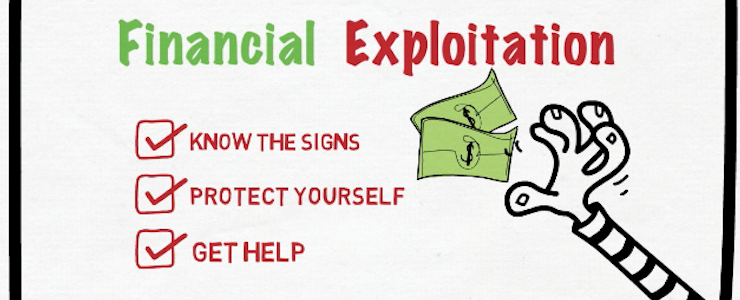Have you ever had someone ask you to…
- lend them money, but never pay it back?
- buy something that you didn’t want?
- let them use your debit or food benefit card?
- sign a blank check?
When things like this happen to someone with a developmental disability, it’s called financial exploitation.
Financial exploitation is when someone uses, tries to control, or doesn’t give you access to your money or resources, and they get something in return. It can happen without your knowledge or permission. It can even happen with your knowledge and permission if you don’t understand what you’re agreeing to.
Financial exploitation is against the law. Know the signs and take steps to protect yourself.
- You are missing money or other things that belong to you, like a food benefits card, debit card, cell phone, electronics, or other valuables.
- Someone pressures you into giving them money. They might point out things they’ve done for you, keep asking until you give in, or threaten to end your friendship.
- You are asked to sign a blank check, or give away your PIN number.
- You feel pressured into buying food or other things for a caregiver, friend or family member.
- You have unexplained withdrawals of money from your bank account.
- You get a phone call threatening legal action unless you give your personal information, like social security number, birth date or bank account number.
Protect yourself from financial exploitation.
- You have a right to know how much money you have. If someone is managing your money for you, ask them to explain how much things cost and how much you have left over at the end of the month.
- Protect your debit and food benefit PIN numbers. Do not tell anyone your PIN or write it on back of the card.
- Always ask for receipts so that there’s a record of how your money is being spent.
If a friend pressures you for money, have a ready reply, such as, “I can’t do that. I need to stick to my budget.” - Practice saying No. People who care about you will not pressure you or talk you out of your money or belongings.
- Don’t share personal or financial information over the phone or online. If it’s a phone call, hang up. If it’s through email or online, do not respond or click on any links they give you. Afterward, ask someone you trust to verify the source of the call or email.
What to do if you or someone you know has been exploited financially:
- Contact Adult Protective Services at 1-866-ENDHARM (1-866-363-4276).
- Make a report online.
- Contact the Developmental Disabilities Ombuds at 1-833-727-8900 if you have concerns that someone who is paid to provide services to you is misusing or taking your money.
- If it’s an emergency and you are in immediate danger, call 9-1-1.
Additional Resources
Abuse, Neglect and Exploitation
Abuse Prevention
Adult Protective Services
Office of the Developmental Disabilities Ombuds
Types of Vulnerable Adult Mistreatment


